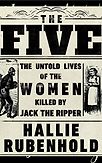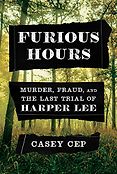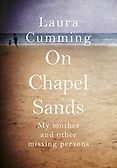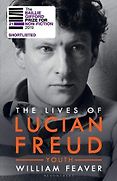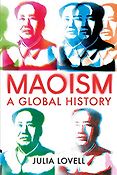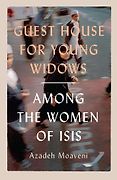Today we’re going to discuss the shortlist for this year’s Baillie Gifford Prize for Non-Fiction. So: are these the best nonfiction books of 2019?
I think they are—as far as we can determine. The ‘best’ is obviously impossibly subjective, but these were the six books that we judges agreed together were worthy of being shortlisted. I’m sure others will make the case for why theirs should be regarded as better. People will have different opinions. But these are six great books that we were all very happy to support and place on the list.
How many books did you consider?
There was a very, very long consideration of, I think, around 300 books. Some were submitted by publishers; some were called in by the judges. So, hundreds of books were considered; lots were then discussed before the longlist was produced. Then we read everything on the longlist again to get to the shortlist, and now we will read everything on the shortlist again to get to the winner.
And with such a wide variety of subject matter, do you have particular criteria to help narrow down your selection?
That’s a great point. It’s very hard to get precisely defined criteria. I think, in practice, there are two central pillars. First there is the question of brilliance at the level of the language and the quality of the writing. Is this a beautifully written book? The simple, subjective view on the quality of the writing and research taken together. Secondly, there’s the importance of the book, its significance. Does it change things? Is it a powerful book, in the sense of moving the dial on an issue?
Sometimes you love the book at the level of the sentence, and sometimes you might want to make a case for a book at the level of its place within a culture. I think the judges recognise both, but it’s been a matter of personal choice how much importance you give to those two ideas, I think.
That makes sense. Let’s talk about the first shortlisted book, Furious Hours by Casey Cep. This is the story of a murder case in Alabama, and Harper Lee’s attempt to write about it. Having assisted Truman Capote while he was writing In Cold Blood, this would have been her own work of true crime.
Yes. This is flat-out one of the most enjoyable books I’ve read this year. It’s fascinating; thrilling in the sense that it is a thriller, a nonfiction thriller. It has all the elements of a John Grisham novel, but it happened in real life.
Although Harper Lee is all over the cover and forms a significant part of the story, she doesn’t even arrive until halfway through the book—at which point you’re gripped by this tale of a man who is thought to have murdered several of his family, before he himself was murdered. His lawyer then began to represent the person accused of killing him. It’s a tremendous courtroom drama. It’s also a tremendous meditation on life in the civil rights period in the southern states of America.
And then you have Harper Lee coming in, trying to write a book. I don’t think it’s telling a story that’s particularly well known, and it’s very well written. Casey Cep works for the New Yorker; it’s written with poise and beauty, and it’s a fine example, I think, of a literary work that you want to rattle through to the end.
I’m sold. That sounds fantastic, and also sounds like several different books in one. There’s true crime in there, there’s literary biography, there’s legal procedural. How does she balance these disparate elements?
It’s divided into three sections: the perpetrator-stroke-victim; the lawyer who represents him—and later the person who tried to kill him; and then you have Harper Lee. ‘The Reverend’ Willie Maxwell is this guy who’s accused of murder, a ‘voodoo priest’ who was said to kill people for the life insurance payouts. The lawyer is this fascinating figure—after Maxwell is murdered, he represents the person who shot him and argues for an insanity defence. The lawyer himself had tried to be a politician, and the racial politics of the South affected his ability to stand as a democratic political candidate.
And then you have Harper Lee trying to write another book after To Kill A Mockingbird. So there are three distinct strands plaited together. That’s the organising principle, but it didn’t strike me that any one of them is more significant than the other.
Next on the shortlist is Laura Cumming’s On Chapel Sands—alternately titled Five Days Gone in the US—in which she investigates the mysterious childhood disappearance of her mother for five days in the 1930s.
This is another beautifully written book. Laura Cummings is an art critic, and as a piece of writing, this sort of stands as an artwork in itself.
She’s reporting the mysterious things that happened to her mother when she was a child. It’s written with real clarity and limpidity, but within it are the artefacts of her mother’s childhood. There are lots of photographs from the family collection. There are some paintings, because art is very important in the story—Cumming writes very, very well about art and photography. It reminded me very strongly of W G Sebald.
Get the weekly Five Books newsletter
But she’s also writing a story about her mum, which is kind of an investigation. It’s not dissimilar to the Casey Cep book in the sense of it being a sort of mystery story. But the artefacts, the means of telling the story, become critical.
Her mother is alive, but ageing. So this is looking back on her mum’s life. And that’s rather beautifully and sensitively and movingly done. Because it’s about family in the end. Modern families, and indeed all families, have their secrets, and have better moments that they’re happy to testify to and those that they’ll try to avoid talking about in public.
So everyone has a certain connection to this story, which is: How do you deal with the ghosts of the past? How do you deal with the complexity of life? Because not everything is as straightforward as 2.4 children and a family. In some ways, this is a hymn to the complexities buried beneath most humble lives.
One thing you said there drew my interest—when you talked about this book as as ‘almost a work of art in itself.’ It comes back, I think, to this question of balancing literary merit and a book’s weight or significance. How strictly does the term ‘nonfiction’ have to be interpreted? When I spoke to the chair of the Man Booker International Prize judges earlier this year, we discussed Annie Ernaux’s The Years, which has been described as a work of ‘experimental autobiography’—yet they accepted it as fiction. Did you have any issues in policing the line of poetic license?
Not really. I think nonfiction is a fairly broad and welcoming church. I think we all know what is and what it isn’t nonfiction. You know it when you see it. All of the books that we’re talking about now are clearly nonfictional accounts. Now, the extent to which they use creative writing, the beauty of artistry… There needs to be quality at that level of the sentence. Whatever one gets chosen in the end will be a beautiful piece of writing.
Like I said, the question then rests on the subject matter. Is the importance, the heft of the subject more important than the beauty of the writing? And there is no right answer to that question. Each judge will have their own calibration as to what they prefer. There are six of us and we’ll have to thrash it out to find one that we can agree on.
Yes.
And by one, I mean one not two.
Ha! I know you had strong views on the recent Booker Prize controversy . . .
Yes, I think it’s ridiculous. A ridiculous thing to do. I mean, we have six judges. We don’t have an odd number, so the chairman can’t be the casting vote. But we’re going to go for one. I think the Booker judges neglected their duties by not awarding it to one person. They literally had one job.
I regard my job, and our job, as to pick one winner and that’s what we’re going to do.
Right! So, let’s get to the third book shortlisted for the title of the best nonfiction work of 2019. This is The Lives of Lucian Freud and it’s the first of two volumes. Does that indicate it’s a work of exhaustive detail?
It is. I mean the level of closeness, proximity to the subject that Feaver got is extraordinary. The level of detail about Freud’s life that he got is extraordinary. This book is kind of a biographer’s tale: biographers will admire it because of its level of engagement, but it also then becomes a broader story about the period, both in terms of location in Soho and in Bohemian London—and remember, this is Sigmund Freud’s grandson.
At the beginning, this is the first part of his life. Freud’s family flees from the Nazis and you have a boy growing up in the shadow of his grandfather. He had things to say himself about family influences and their impact on people. So on one level, this is a story of analysis, but on another it’s just the rich tapestry of life that the artist inhabited in Soho and London in the forties, fifties and sixties.
It’s very nicely written; the level of detail is absolutely fantastic. And in some ways, it’s not ostentatious about the subject. It doesn’t make grand cases for Lucian Freud as an artist. It just says, ‘Here is everything, the fabric of his existence, and therefore the fabric of lots of other existences around him,’ and delivers it in a very nicely organised, nicely written way.
Julian Barnes has in the past written very perceptively of how Lucian Freud himself did not tend towards introspection, despite his psychoanalytic heritage. How does William Feaver approach this? Does he analyse his subject?
I think it allows the reader to conduct their own analyses of the subject. Because, like I said, it’s the level of detail; it’s an eye for a funny anecdote; it’s an apt quotation, lots of quotations; it’s not very judgemental. I don’t think it is an analysis in the way of a great Freudian figure placing his subject on the couch and drawing conclusions. That’s not how I read it. I find it much more a book by someone who wanted to weave together a person’s life, and does so by presenting beautifully turned, exhaustive detail about it. It’s the detail that sparkles out.
Feaver does draw from a wealth of material. Could you talk a little bit more about his access?
Well, he was close to Freud. He spoke to him almost every day. He had absolute contact with Freud himself. As a result, there are lots of direct quotations in the book. This is someone who has a tremendous amount of contact with his subject, which I’m not sure is always true of biographers.
And it’s a very readable book. That’s the other thing. I keep coming back to the idea of thrillers—not because that’s necessarily always the way to judge a great book, but because there is something compulsively readable about them. That, I think, is really important. This could have been a book about a great painter that was dry and academic, and it isn’t: it’s full of the blood and guts of his life. All the books that are on this list have a narrative force about them. You want to get to the end.
Absolutely. That’s very important to me as a reader. Although, our next book is a very different proposition—this is Julia Lovell’s landmark Maoism: A Global History. We interviewed Julia not long ago. Tell me about her book.
It’s a difficult book, I suspect, to sell. It probably is the least commercial book on the list, because it is an intellectual history of a vast and imposing subject. And as an imposing subject, not only because it’s complicated, in that the story isn’t straightforward, but also because it’s a story often simplified and turned into postcards, caricatures and pop art. Everyone cites Mao and knows Mao, knows the image of Mao, not least because of how he’s presented in in pop art.
So to say, this is a vast, sprawling, global history of a man’s thoughts, and then to attack those thoughts—what I find so invigorating about this book is it attacks with intelligence. It doesn’t try and get lost in every single detail. It has a plan, it has a scheme, and it goes through each aspect of Maoism and its effect on popular culture. And, indeed, global culture and political culture. Taken together, that strikes me as an extraordinarily ambitious undertaking and I think it’s delivered with real wisdom and intelligence, and with style that you wouldn’t necessarily expect in a political theory history.
Because, as you suggested before, this is a readable book too.
Yeah, it must be. Otherwise there’s no point. It’s readable without simplifying. Because maybe one of the worst things you can say about a book with such an academic pedigree is that it’s ‘readable’, because people might think that’s code for it skipping over things and oversimplifying—but I don’t think this does that at all, actually. I think this has real intellectual heft.
What I find most admirable about it is that it has a plan at the level of the sentence, so it can convey the information it wants to convey. And that’s a real trick because this is, at its broadest, a not particularly familiar story about the global impacts of Maoism. And yet on the other side of the spectrum, it’s a very overfamiliar story, because Mao is someone who has been commodified ironically and simplified and turned into slogans and images. Dealing with those two polarities is what the book does really well.
Fantastic. The next book we’re going to talk about moves from looking at history at a global scale to a personal scale. This is Azadeh Moaveni’s Guest House for Young Widows. This profiles 13 women, often teenagers, who’ve left their homes and countries to become ISIS brides. Tell me why this is in the running for the title of the best nonfiction book of 2019.
The importance of this book is the way it gives voice to people whose motivations could easily be misunderstood, or subject to political forces that are completely unforgiving. This gives voice to a series of women whose voice is hard to listen to, hard to hear. In doing so, it makes us reflect on the politicisation of religion, how people of different faiths live together. There’s also one of the book’s contentions: that something as orthodox as Islamism can be seen to be revolutionary if your life is otherwise lacking in choices.
To my mind, it makes you think about what options that fields for people. Because at one level, these are women entering a system that is extremely misogynistic, extremely limiting to women—getting drawn into ISIS. And yet the reality of their life before that has no great aspect of freedom, no great aspect of modernity, either. And so this gives colour and it gives perspective and it gives three dimension to stories of people that it’d be easy to dismiss as another person who’s joined an obscene cult. Which is a very straightforward narrative and one which has some arguments for it.
But this serves to say: Let’s listen to people. Let’s hear why they do the things that they do, and give them the dignity having their story told.
Does Moaveni suggest we should look at these women as victims?
No, I think that’s different. I mean, there is an aspect of victimhood, in the sense that often they are placed in situations where there are very limited choices. One expects to have sympathy for people whose lives aren’t straightforward. It’s not that everyone who joins ISIS is evil. But the corollary isn’t straightforward, either—that everyone who joined ISIS is a victim.
I think there is balance. Certainly they have made grotesquely bad decisions. But they are looking for answers in a world that doesn’t give them. And in certain contexts you can understand why they made the decisions that they made. I think that’s the bravery in this book, it looks to understand why people made decisions which, to third parties, seem completely inexplicable. I think that’s the argument. It is a timely and important book.
Well, finally, we’ve come to The Five: The Untold Lives of the Women Killed by Jack the Ripper. I suppose in writing this book, the author Hallie Rubenhold hopes to right this wrong: that murder victims, especially women, are much less remarked upon than their killers.
Yes. Also they become fetishised through the manner of their death. They’re just dismissed, sometimes (in this case) even categorised as sex workers. One of Rubenhold’s arguments is that one of the victims was a prostitute, but four of them were not.
This is a deeply, deeply moving book built from very scant historical evidence. One of the reasons she wrote this was, these are women without voices; these are women who historical record obscures. What she’s done—through very, very good research, it strikes me—is fleshed out their stories by finding little bits of details about their lives, the lives of their families, their parents, their parents’ parents. She creates a narrative where you see people nearly escaping the fate of horrible poverty, but not quite. So it’s a tragic tale because there are moments in these women’s lives where they nearly get out; they nearly escape the misery that life has allotted to them. And then just a couple of things go wrong.
Five Books interviews are expensive to produce. If you're enjoying this interview, please support us by donating a small amount.
What’s brilliant, I think, is that their death would be in some way incidental—if not for the fact that it gives a shared reason to write their stories together. They couldn’t escape that fate, but their lives are given dignity and colour. Otherwise it would just be: ‘Jack the Ripper killed people in this flamboyant fashion. Let’s all think about Jack the Ripper and go to a theme park based on it.’ It completely, completely writes against that tradition.
Jack the Ripper is not in this book. We know how they die and that they die. And then the rest of it is: here are the lives of people, women, working class women, who are often written out of the history books. And this seems to me to be a brilliant and brave voicing of people who otherwise would be voiceless.
Rubenhold argues that “the cards were stacked against these women from birth.” Is this an angry book? Is it a manifesto of sorts?
That’s an interesting question. I think you can read anger into it . . . I mean, it’s clearly the case that they were given very little chance. That’s what so moving about it. There’s moments where they nearly, nearly defeat those odds.
At some point, one of them reaches a good situation, gets into a good marriage, has kids. It looks like happiness is nearby, and then it falls away from her. Even if they’d succeeded, they would’ve succeeded only in the context of their own time, but they don’t even get that.
You can get angry reading this book. I think there’s a relevance to how we perceive women, how we perceive victims, how we perceive sex workers especially, and how they can be dismissed—as if it’s reasonable not to care about the horrendous things that happened if the victims were sex workers. All of those political undertones are there, but it didn’t strike me as a political book and is all the stronger for it because it’s not just simply a manifesto. It’s actually a beautiful piece of history, that makes you think once you’ve put it down.
Fantastic. So we have an extremely exciting shortlist here. We’ve got biography, group biography, reportage, a sprawling history. Having read so many nonfiction books this year, you’re in a great position to say, do you feel optimistic about the state of nonfiction in 2019?
Yes. To use that word again, it’s a really thrilling shortlist. One thing I have noticed is a certain, there’s a lot of ‘I’ in nonfiction now. People don’t, as a rule, write straight histories—they are encouraged to write their place into history, or into the context of the subject that they’re describing. There’s lots of, ‘here’s how I felt when I discovered X,’ or ‘here’s how Y affected my life.’ And in some ways I think that that’s rather laudable because it means people have a chance to write with feeling and personality. But I think there’s a risk that can become a cliché.
The thing that occurs to me is that these books rise above all that. They tell a story where, if there is a personal connection, it is worthwhile—Laura Cumming being a really good example of that—and it adds to the book. The danger is, if you have people being encouraged to write breathily about their own experience, it can affect the quality of the research and the writing. So that’s the risk in nonfiction; there is a certain convergence of approach and tone. And that brings its own risks.
Set against that though, I think there is some fantastic writing going on, some really, really fantastic, vibrant, exciting writing. This shortlist is a really good example of that. And I’m really pleased and proud that we’ve picked these six books because I don’t think you could ever say that they all straightforward or boring. There’s a lot of life in them and I think that’s what you want in any book, fiction or nonfiction: life, pulsing away.
See all the recommendations in our best books of 2019 series.
Interview by Cal Flyn, Deputy Editor
November 4, 2019. Updated: May 22, 2023
Five Books aims to keep its book recommendations and interviews up to date. If you are the interviewee and would like to update your choice of books (or even just what you say about them) please email us at [email protected]

